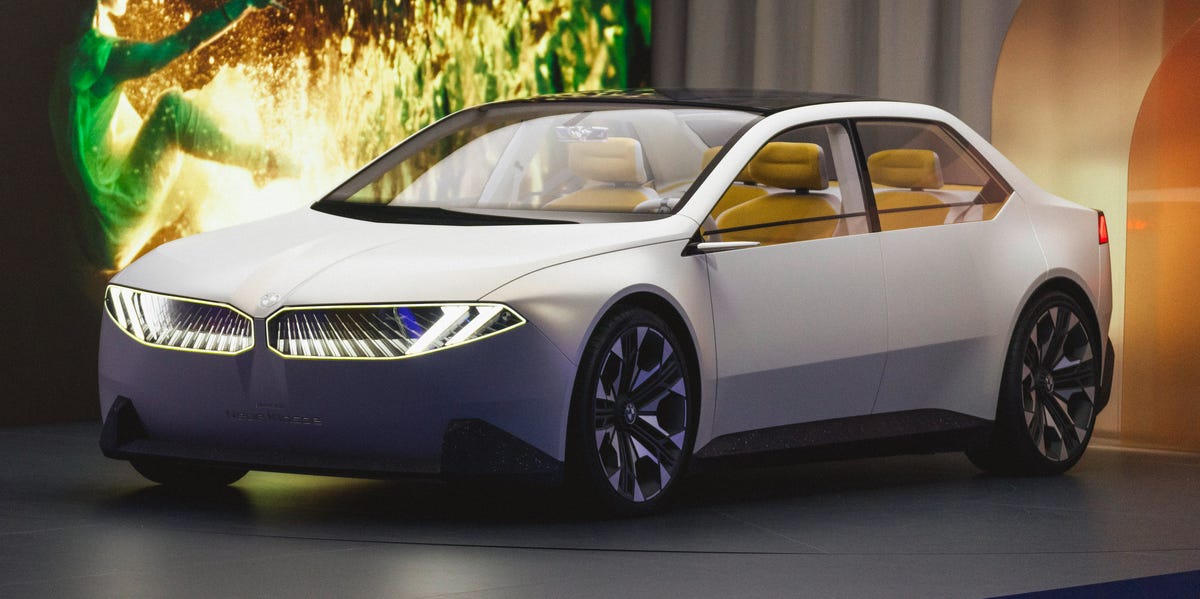The 2025 BMW i3 is the original modern electric vehicle that started the BMW i-Series revolution, delivering efficient urban mobility, innovative design, and practical range at approximately $48,000. This comprehensive guide explores BMW’s pioneering compact electric car, perfect for city dwellers and first-time EV buyers.
Design and Exterior
The BMW i3 features distinctive, purpose-built design emphasizing urban practicality and aerodynamic efficiency.
Exterior Dimensions:
- Length: 4,012 mm (158 inches)
- Width: 1,775 mm (69.9 inches)
- Height: 1,578 mm (62.1 inches)
- Wheelbase: 2,570 mm (101.2 inches)
- Ground Clearance: 140 mm (5.5 inches)
- Curb Weight: Approximately 1,405 kg (3,096 lbs)
- Drag Coefficient: 0.29 Cd
The iconic proportions and two-tone design language instantly identify the i3. The innovative carbon fiber body combined with aluminum frame creates an ultra-lightweight platform. Suicide rear doors provide easy access to rear seats, while large glass panels maximize visibility and light.
Design Features
Unique Body Design:
- Prominent kidney grille sealed for efficiency
- Distinctive LED light signature
- Compact wheelbase optimized for city driving
- Available solar-charging roof
- Carbon fiber body panels
Performance and Single-Motor Powertrain
The i3 features a single rear-mounted motor optimized for efficiency and city performance.
Powertrain Specifications:
- Motor Type: Permanent Magnet Synchronous Motor (PMSM)
- Power Output: 181 hp (135 kW)
- Torque: 199 Nm (147 lb-ft)
- 0-100 km/h (0-60 mph): 7.3 seconds
- Top Speed: 160 km/h (99 mph)
- Drive Configuration: Rear-Wheel Drive
The modest power output is perfectly suited to city driving, where rapid acceleration matters less than efficiency and maneuverability.
Battery, Range, and Charging
Battery Specifications
Battery Type: Lithium-ion liquid-cooled
Total Capacity: 42.2 kWh (120 Ah)
Usable Capacity: 37-40 kWh
Architecture: 360V system
EPA Estimated Range: 188 miles (303 km)
Real-World Range: 160-180 miles in typical mixed driving
The compact battery is sufficient for urban commuting with range anxiety minimal for daily use.
Real-World Range Performance
- Urban Driving: 200-250 km per charge
- Mixed Driving: 180-200 km per charge
- Highway: Limited practical highway range
- Cold Weather: 25-30% reduction expected
Charging Capabilities
AC Charging (Level 2):
- Maximum Power: 11 kW with BMW Wall Box
- 10-100% Charging Time: Approximately 4-5 hours
- Range Added Per Hour: Approximately 80-100 km
DC Fast Charging:
- Maximum Power: 50 kW on compatible chargers
- 10-80% Charging Time: Approximately 30-40 minutes
- Range Recovery in 30 Minutes: Approximately 100 km
Interior and Urban Practicality
The i3 interior maximizes space despite compact external dimensions, with minimalist design and sustainable materials.
Seating Configuration
Seating Capacity: 4 passengers (suicide doors)
Front Seats: Comfortable with manual adjustment
Rear Seats: Two individual seats suitable for children or shorter adults
Interior Materials: Sustainable materials prioritized, recycled content throughout
Cabin Features
Storage:
- Frunk: 64 liters
- Rear Trunk: 260 liters
- Total expandable to 1,100 liters with rear seats folded
Technology:
- 8.8-inch touchscreen central display
- Apple CarPlay and Android Auto integration
- BMW Connected Drive services
- Navigation with real-time traffic
Warranty and Service
Basic Vehicle Warranty: 4 years or 50,000 miles
Battery Warranty: 8 years or 100,000 miles
Transferable: Yes, with transferable battery warranty
Ownership Costs
Insurance
Estimated annual: $1,100-$1,300 (lower due to modest value)
Charging Costs
- Full charge: $6.00-$7.20
- Daily 30-mile commute: $1.20-$1.44
- Annual equivalent: $288-$346
Maintenance
Minimal servicing required with electric drivetrain
5-Year Estimate: $800-$1,200
Total 5-Year Ownership
- Insurance: $5,500-$6,500
- Charging: $1,440-$1,730
- Maintenance: $800-$1,200
- Registration: $1,000-$1,500
- Total: $8,740-$10,930
Driving Experience
The i3 delivers nimble, efficient urban performance perfect for city navigation.
Acceleration and Performance
The 181 hp motor provides adequate acceleration for city driving and highway merging. The 7.3-second 0-60 time is not thrilling but sufficient for practical transportation.
Handling and Maneuverability
The compact wheelbase and low weight create excellent maneuverability. The tight turning radius makes parking and navigating narrow city streets effortless.
Comfort and Practicality
Despite compact proportions, the i3 offers surprising interior spaciousness. The tall greenhouse and minimal dash extend usable cabin volume.
Pros and Cons
Strengths
✓ Extremely Affordable: Sub-$50,000 pricing with federal credits
✓ Excellent Maneuverability: Perfect for urban driving
✓ Innovative Design: Unique styling stands out
✓ Lightweight Construction: Carbon fiber body prioritizes efficiency
✓ Low Operating Costs: Minimal maintenance and affordable charging
✓ Sufficient Urban Range: 188 miles adequate for daily use
✓ Fun to Drive: Responsive handling despite modest power
Considerations
⚠ Limited Range: 188 miles not suitable for long-distance travel
⚠ Slow Charging: 50 kW DC charging vs. 200+ kW on newer models
⚠ Limited Power: 181 hp feels underpowered on highways
⚠ Rear Seat Comfort: Suicide doors and limited legroom
⚠ Smaller Battery: Older battery technology than newer models
⚠ Being Phased Out: Production ending as iX1 takes over market
Final Verdict
The BMW i3 is an excellent choice for urban commuters and first-time EV buyers, delivering innovative design, excellent maneuverability, and genuine efficiency at an affordable price. While being phased out in favor of the iX1, remaining stock represents exceptional value for city-focused buyers.

